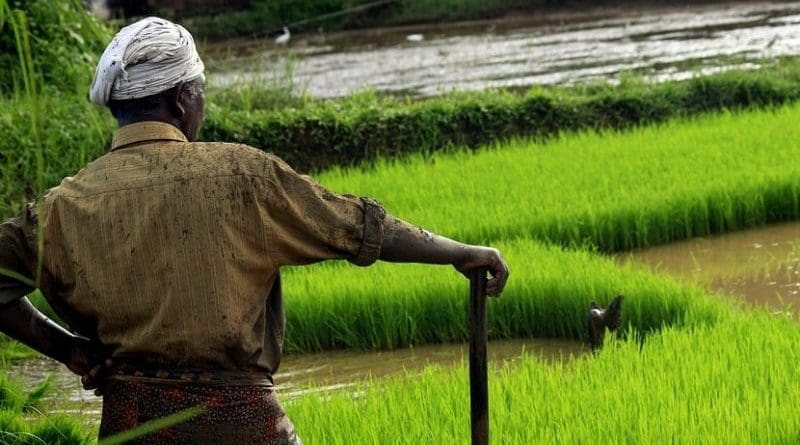Indian Government Bows To Pressure, Repeals Farm Laws – Analysis
By Sthanu R Nair*
Despite constituting only 16.38 per cent of gross domestic product, agriculture plays an important role in India’s economic development. The sector employs over half of India’s workforce, feeds its huge population, generates demand for industrial goods, supplies raw materials, and earns foreign exchange. But farmers still face several challenges in improving their income and living standards.
Historically, India’s policy responses were rooted in the ideology of government support and intervention. The private sector was not provided adequate opportunities to develop the agriculture sector. This is despite the transformation achieved in the industrial and services sectors due to greater private sector participation after the opening up of the Indian economy in 1991.
Efforts made over the years by India’s federal government to introduce market forces into the agriculture sector through regulatory reforms have not yielded their desired results due to the indifferent approach of state governments. Since agriculture is a state matter within the Indian Constitution, state governments have greater influence in implementing reforms. Due to their belief that market forces will harm farmers, the states have adopted a cautious approach toward reforms facilitating private sector participation in agriculture.
In September 2020, as part of economic initiatives rolled out to revive the Indian economy after COVID-19, the Narendra Modi government passed three laws in the Indian Parliament targeting agricultural reform. The laws aimed to facilitate greater private sector participation in food procurement, trade and storage, and free farmers from state government-controlled agriculture markets.
The states regulate agriculture markets in India under the purview of the Agricultural Produce Marketing Committee Act. Under this Act, the sale of agricultural commodities is only allowed in state government-controlled agriculture markets, called mandis. Sales in the mandis are conducted through an auction mediated by market intermediaries called Commission Agents. Traders and buyers are prohibited from buying commodities outside the mandis. To fund infrastructure facilities at the mandi, a mandi fee is charged to traders and a licensing fee is collected from the agents. The agents charge commission fees on mandi transactions.
This system of agricultural marketing worked against farmers in many ways. They did not have the option to do business directly with buyers outside the mandi system, and so could not gain better prices. This constraint, combined with the political connections of traders and agents, granted buyers monopoly power and allowed them to exploit farmers by fixing prices and cartel behaviour.
Due to lobbying by existing players in mandis, new buyers, including contract farming firms, were not encouraged to join, hampering free and fair trade, efficient price discovery, and private sector investment. Finally, the burden of mandi, licence and commission fees lowered incomes for farmers.
The Farmers’ Produce Trade and Commerce (Promotion and Facilitation) Act 2020, one of the three legislations enacted by the government, aimed to ensure remunerative prices by enabling farmers to sell their produce outside the mandis and facilitating electronic trading platforms.
The second law, The Farmers (Empowerment and Protection) Agreement on Price Assurance and Farm Services Act 2020, aimed to provide a legal and regulatory framework for protecting and empowering farmers engaged in contract farming.
The third legislation, Essential Commodities (Amendment) Act 2020, aimed to attract more private sector investment in agricultural supply chains by easing the restrictions on the stocking of agricultural commodities by traders.
The laws evoked strong protests from farmers and farmer organisations, particularly from the states of Punjab, Haryana and parts of Uttar Pradesh, on three major grounds. First, the farmers feared that increased private sector participation in agriculture trade would result in the withdrawal of the minimum support prices offered by the government for agricultural commodities. Second, they feared that the law would lead to the corporate takeover of the Indian agriculture sector. Third, the farmers contended that they were not consulted at the drafting stage of the laws.
While there is merit in the last criticism, the other two concerns have no solid basis except that they are grounded in a lack of trust and confidence in the government and the role of the private corporate sector.
Despite the government’s offer of a written assurance on the continuation of the minimum support price system, farmers took to the streets for over a year demanding repeal of the laws and the passage of a new law guaranteeing minimum prices for all agricultural produce. A higher fiscal burden and inflationary pressure have been key concerns for the government regarding guaranteed support prices. Government attempts to address the farmers’ concerns, such as assurances by Prime Minister Modi and official dialogues with farmer organisations, did not yield the desired results.
As there were no signs of farmers relenting, and crucial elections are scheduled for early 2022 in the Punjab and Uttar Pradesh state assemblies, the government bowed to political pressure and repealed the three laws in November 2021. It also promised to create a committee to examine the issues concerning the minimum support price and accepted all other demands put forward by the protesting farmers. In response, the farmers called off the agitation with a resolve to continue the efforts to ensure their rights, particularly to secure a guaranteed minimum support price.
*About the author: Sthanu R Nair is Professor of Economics at the Indian Institute of Management Kozhikode and teaches Economics and Pubic Policy.
Source: This article was published by East Asia Forum

